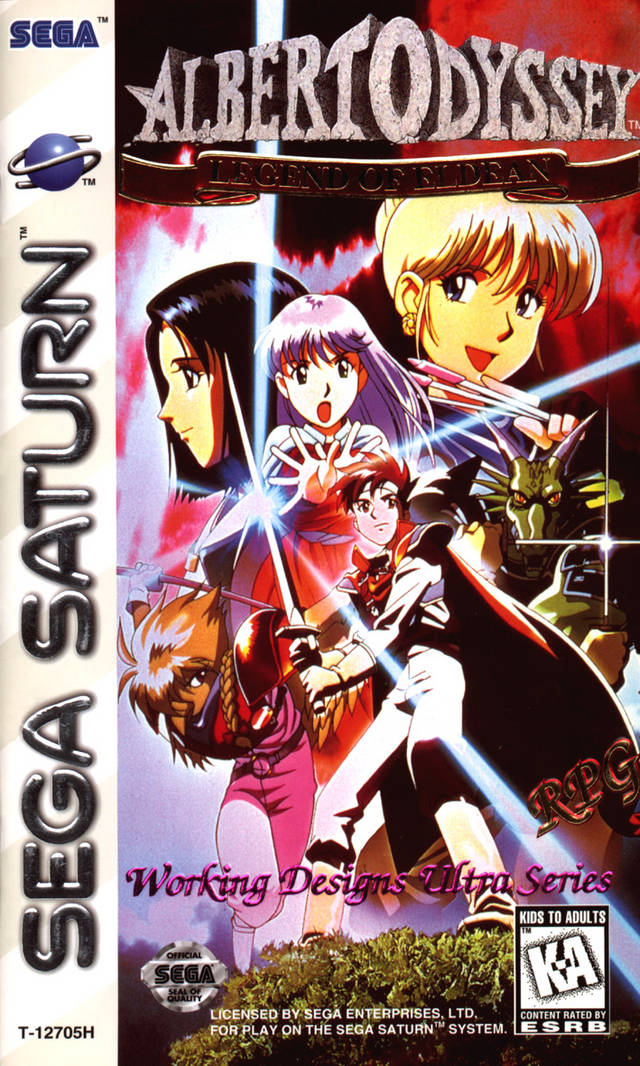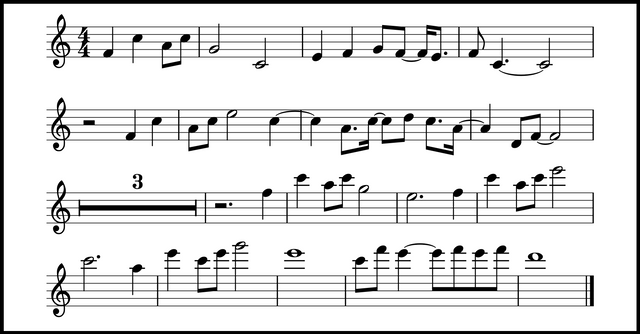Returning back to the world of Albert Odyssey once more, we have the sole Sega Saturn entry and the last game of the series, Albert Odyssey: Legend of Eldean, known in Japan as Albert Odyssey Gaiden.


Developed and published by Sunsoft for the Sega Saturn in Japan, while in America it turned out to be the only English release of an Albert Odyssey game, localized and published by Working Designs. As with the previous games, Naoki Kodaka wrote the soundtrack.
More time and budget was put into the Saturn score than the previous games, enabled by the Saturn's far superior soundchip. Both previous Albert Odyssey games had seen a soundtrack release, on a single disc, but Legend of Eldean was a much bigger score than either and saw a two-disc release.
Seven genuine, live session musicians were hired for the first fourteen tracks of the first disc. From VGMdb:
Violin: Yayoi Sakiyama
Flute: Yoko Niwa
Oboe & English Horn: Kaori Miyazawa
Guitar: Shigeru Watanabe
E.Guitar: Shin Hasegawa
Percussion: Masato Nishimura
Keyboard: Wataru Iwamoto
Synthesizer Programing: Naoki Kodaka
The score itself is a big leap from the SNES games - though the remainder of the score is dominated by MIDI-card sounds, they are far better than on the SNES.

As mentioned, the first fourteen tracks of the game include live musicians, alongside Kodaka's synthesizer programming, which (I assume) includes the ROMpler module used for instruments in the rest of the game. The tracks are exceptional, revealing Kodaka's love for the solo oboe even more as he writes a number of emotional, passionate solos for them. "Prologue" includes one, serving as a dark prelude to the game.
"Opening 1" opens with a dark, low strings motif which will appear in two further tracks of the game. "Adagio" is a fittingly slow and peaceful theme, bringing in the organ to good effect. "Title" opens with a powerful horn motif before moving into a more romantic bit for solo flute, changing back to horns part of the way through.
An absolute standout is "Main Theme 1," which, according to my sources (Namely, Flying Omelette) is the first overworld theme. It's absolutely beautiful, slightly Celtic and probably influenced by New Age, too, with its synth washes and choir. The melody for solo violin is gorgeous. I have transcribed it to the best of my ability, but being performed live, it's impossible to transcribe it flawlessly. I have foregone notating articulation, descrescendos to nothing, and ornamental notes.

"Estranto" is a beautiful piece for harp and flute. And the improved sound quality granted by the Saturn lets Kodaka employ a much finer sounding harp than in the previous AO games. "Mysterioso" (according to FO, who has played and reviewed the game, so they would know) is the second overworld theme, a darker and - as the name suggests - more mysterious piece. Synths are much more prominent and the solo goes to the oboe. The descending, dream-like string progressions at certain points are especially effective.
"Main Theme 2," for the airship, is another gorgeous piece of beautifully flowing music. It's a faster-tempo piece, arguably more fun, too, yet in some ways darker, thanks to the staccato strings that run throughout the music.
Flying Omelette suggests that "Solitude" and "Serenade" got their names mixed up in translation and I, for one, believe it. "Serenade" is a sad, almost melodramatic, piece of music, while the supposed "Solitude" is a far more romantic piece of music.
"Aria" is misnamed: it's just a simple waltz. The next three tracks are all short and simple but effective nonetheless - "Sailing," "Game Over," and "Fin 1." And that covers all the tracks with session musicians.
This still leaves a few dozen tracks of music. So with that in mind I'm going to try and highlight tracks of excellence rather than go track-by-track.
Firstly, to get it out of the way, the battle themes: they are, like the previous AO games, not exceptional. Indeed, two of the three fall straight under mediocre. The best of them undoubtedly is "Assault," a driving, rock-inflected tune with a sampled drum beat that sounds like it came out of the song that gave us the Amen Breaker. Rock organ and some ethnic percussion is scattered here and there. The CD included two arranged tracks - of this one, as "Battle (Arranged Version)," and also "FIN 2 (Arranged Version)." The arrangement is quite listenable, certainly an improvement on the original, but you can only do so much, when there isn't a strong melody to begin with.
Moving beyond this, we have a soundtrack far superior to the previous AO games.
"Remembering Those Who Have Passed On" is a touching, emotional piece of music, impaired only by a weak clarinet lead. Despite its sadness, there are still glimmers of hope shimmering over it.
"A Gentle Breeze on the Plains" is a marvelous piece which blends a Western and Medieval feel with its guitar-like lute strumming and ocarina. Percussion brings an "exotic" (Celtic?) feel to it. As the pub theme, we have the fantastic "Palace of Pleasure" and its acoustic guitar and castanets. It's fun!
Skipping some tracks we arrive at "Descendant of the Dragon," a gentle, melancholy piece of music with a great panpipes melody.
A favorite track of mine is the grand "Heaven, Resounding Wings," a fantastically brassy piece of music with great power to it. More than that, it's another fun track.
"Distant Fortress" blends two musical styles one wouldn't expect to fit together so well. As Flying Omelette puts it...
Balan's Fortress music sounds one part march and one part mariachi.
It works surprisingly well!
"Invitation to the Darkness" is the second of the two in-game tracks to reprise the low strings motif from "Prologue" (you can hear it also in "Overture to an End"), this time with the addition of an oboe solo with that ever-so-vague 'Middle Eastern flair' that occasionally appears in Kodaka's AO music.
Another favorite of mine is the also grand but far more ominous "Castle of the Heavens," with its swift staccato brass phrases and its tubular bells - it's a silly-sounding name, but their sound is akin to that of a church bell. It's a marvelously grand and rich sound.
The final track I'll highlight is "Magic Kingdom," a quick waltz which drags in castanets, 'Middle Eastern flair', and a clarinet to create a unique atmosphere. I'm not quite sure it is magical, but it's rather nice to listen to.

I would, of course, hesitate to put this score up there beside, say, Final Fantasy VII or Chrono Cross. Truth be told, I never really considered it. For all its qualities, it's not as good as that. Kodaka's not as skilled a melodist, nor so adept at coming up with unique combinations ("Distant Fortress" excepted) of instruments or styles. Thin sound hampers many of the tracks, and poor battle themes hamper the entire score. The best tracks by far - certainly the only ones that approach the level of those games mentioned - are the two "Main Theme" tracks with live instrumentalists.
Besides the tracks I highlighted there's a good mixture of similarly good tracks, if ones less than unique to my ears, and more filler-type tracks. Even so, it's a great leap up from the first two games.
Ultimately, I feel fully justified in giving this a 7.4 out of 10.
And for the future? Well... I've been doing a lot more reading lately, so maybe I'll try and do more book reviews, as soundtrack reviews are quite time-consuming.
Thanks for another nice review to read. I think 7.4 is a fair score for this soundtrack, with the two Main Themes (which are the only tracks I'd say come to the quality of Chrono Cross's best, like Time's Scar) being the main reason to remember it, although other tracks in Legend of Eldean are good as well (like A Gentle Breeze on the Plains, as you pointed out).
Downvoting a post can decrease pending rewards and make it less visible. Common reasons:
Submit